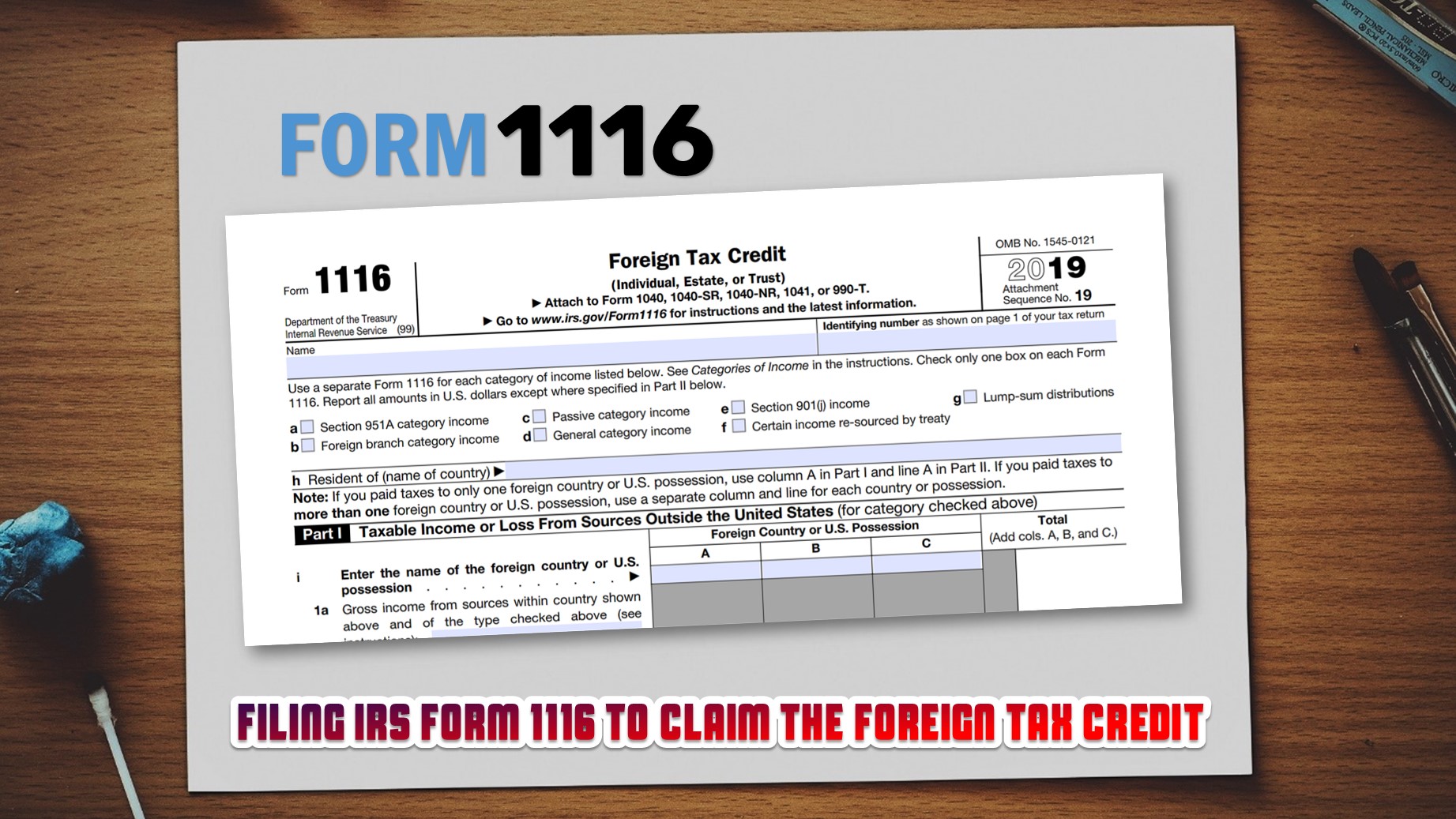
The IRS offers a way for expats to avoid paying two levels of tax on the same income. Provisions that enable this are the foreign tax credit and certain exclusions.
After United States citizens or permanent residents relocate to a foreign country, they still remain connected to the U.S. One of the less obvious ways is through taxes imposed on income that they earn elsewhere. Even when that income originates beyond the nation’s borders, there may be a tax liability payable to the IRS. To help offset such expenditures, which are known as double taxation, the government provides a few alternatives. The most popular ones include the form 1116 foreign tax credit and several exclusions. Those exclusions are usually the foreign earned income and foreign housing exclusion.
While the dollar amount eligible for an exclusion tends to exceed the credit, it is seldom as helpful. The reason why is that tax credits represent dollar-for-dollar reductions in the final tax liability. Exclusions are simply reducing the taxable income that has yet to be assessed for the tax liability. Thus, a U.S. citizen abroad who never filed a tax return will likely benefit more from the form 1116 foreign tax credit. Not to mention that exclusions cannot be carried while the foreign tax credit carryover lasts surprisingly long.
What is Foreign Tax Credit?
Form 1116 foreign tax credit is a non-refundable credit based on the tax payable to foreign countries. Consider, for instance, a U.S. citizen abroad who never filed a tax return. If they are working in a foreign country, their form 1040 is likely going to contain substantial foreign income. Well, paying both the U.S. and foreign tax on the same money is counter-intuitive. Hence why the final tax liability will reflect a reduction based on the tax already deemed payable to the foreign country. The foreign tax credit carryover further allows taxpayers to utilize the credit for up to 10 years after. They can additionally use it to offset their earnings for one year prior to the filing date. Note that the foreign tax credit carryover is one of the most generous carryovers in the Internal Revenue Code.
Eligibility Requirements
A U.S. citizen abroad who never filed a tax return will have to meet eligibility criteria to qualify for the form 1116 foreign tax credit. The first and most obvious one is that the taxpayer is a U.S. citizen or a permanent resident. Individuals who are non-resident aliens will not qualify as they file 1040-NR forms and follow a different set of guidelines. The next requirement is that the taxpayer has foreign-source income that was earned outside of the U.S. borders. Finally, the source of income has to be legal in order for the form 1116 foreign tax credit to apply.
When considering eligibility, a U.S. citizen abroad who never filed a tax return will have to analyze their income carefully. The reason why is that the IRS disallows certain types of earnings. For example, taxes imposed on oil, mineral, boycott, or gas-related sources will be ineligible. In addition, North Korea, Iran, Cuba, Syria, and Sudan are completely excluded from the calculation. IRS publication 514 explains that these countries have:
- Been deemed to repeatedly support international terrorism or;
- The U.S. has no diplomatic relations with them or;
- The U.S. does not recognize their governments.
Consequently, someone earning income in one of them will not have the benefit of form 1116 foreign tax credit.
Calculating Foreign Tax Credit
Calculating form 1116 foreign tax credit will be a fairly difficult calculation for a U.S. citizen abroad who never filed a tax return. First, since the credit is non-refundable, the primary foreign tax credit limitation will always be someone’s U.S. tax liability. The first page of the Form 1116 is where foreign gross income, deductions and losses, and foreign taxes go. These are reported on lines 1a, 6, and 8, respectively. The actual credit is calculated on the next page.
Taxpayers start off by copying the foreign taxes paid from page one and adding any carryovers. Remember, foreign tax credit carryover lasts up to a decade. Then, the taxpayer has to make certain reductions or re-classifications on lines 12 and 13, if needed. These are explained in the Form 1116 instructions and seldom occur in the real world. After calculating the total amount of foreign taxes eligible for a credit, a U.S. citizen abroad who never filed a tax return has to calculate total foreign income. Doing so simply means copying line 7 from page one making adjustments that will be explained soon.
Once the taxpayer has their total foreign income, it is time to calculate the total income (including the U.S. sources). The reason why is that these two numbers are going to form a fraction that multiplies the aforementioned credit. So, if the total foreign income is $50,000 and the total income is $100,000, the percentage will be 50. The last step is to multiply the tax liability from Form 1040, line 11a by that percentage. That will give the U.S. citizen abroad who never filed a tax return their final form 1116 foreign tax credit. In case that the total foreign taxes are less than the final number, they will be used instead. By doing this, the IRS basically established a secondary foreign tax credit limitation. How? Well, people will have to take the lesser of total foreign taxes or allocation between total versus only foreign income.
Income Adjustments for Foreign Qualified Dividends and Gains
There are some downsides of choosing form 1116 over foreign income and foreign housing exclusion. One of them is the complex process that filers have to go through. A perfect example would be the adjustments that come with foreign qualified dividends and gains. These are the previously mentioned adjustments from line 16 on page two of Form 1116. They are necessary because qualified dividends and gains receive preferential treatment in the U.S. Most other countries have no such provisions and those earnings get taxed just like any other income. Fortunately, a U.S. citizen abroad who never filed a tax return can rely on the following guidelines:
- If taxed at 0 percent, exclude it completely;
- If taxed at 15 percent in the foreign country, multiply that income by 0.3788;
- If taxed at 20 percent in the foreign country, multiple by 0.5051.
Although it is a fairly simple calculation, it will represent a substantial decrease in those earnings under U.S. standards.
Apportioning the Interest Expense and Charitable Contributions
A U.S. citizen abroad who never filed a tax return who is filing form 1116 has to apportion interest. The IRS demands the asset method of apportionment. It operates by looking at the average value of assets held in the foreign country and the U.S. Those values go into the apportionment process that yields a fraction that multiplies the interest expense. Charitable contributions rules are a bit looser as they only apply to donations that taxpayers make in Mexico, Canada, and Israel. This is because of the tax treaties and agreements between the U.S. and other nations.
Understand Applicable Tax Treaties
It is crucial that a U.S. citizen abroad who never filed a tax return knows how tax treaties operate. They do not necessarily have to fully comprehend all the ins and outs here. Nonetheless, having a general idea will be very helpful. The easiest way to explain is to realize that the withheld foreign tax will usually not equal foreign tax credit. Currently, the U.S. has 58 income tax treaties that sometimes qualify people for lower foreign withholdings. Hence why the numbers of the withheld taxes and credits may not perfectly overlap.
Considering the Exclusion
Even with the foreign tax credit carryover, taxpayers may still want to look into foreign income and foreign housing exclusion. The current limit for foreign income is set at $105,900. Since the credit option comes with multi-layered foreign tax credit limitation, the $105,900 amount is fair. The foreign housing exclusion also has a limit amounting to 30 percent of the overall exclusion. Still, it can turn out to be relatively favourable when cross-referenced to foreign tax credit limitation.
Preparing for the Filing Season
The deadline for a U.S. citizen abroad who never filed a tax return to submit one is usually June 15. That date presents a two-month delay as other taxpayers have to submit theirs by April 15. IRS’s goal with the postponed deadline was to provide expats with some additional flexibility. After all, figuring out foreign tax credit limitation, foreign tax credit carryover, and income or foreign housing exclusion is quite tricky.
Upon completing the calculations that come with the foreign tax credit, Form 1116 should be sent alongside Form 1040. Luckily, Form 1116 is only two pages long with four sections. Information that goes to the first and third boxes is probably the hardest part of the work. Taxpayers should ensure that they have access to all of their prior returns. Since foreign tax credit carryover is so long, it can be very helpful in the years to come. Ultimately, seeking professional assistance from someone who understands foreign tax credit limitations should take place. It would also be an outstanding time to inquire about foreign income and foreign housing exclusion.
The information is not intended to constitute professional advice and may not be appropriate for a specific individual or fact situation. It is written by the author solely in their personal capacity and cannot be attributed to the accounting firm with which they are affiliated. It is not intended to constitute professional advice, and neither the author nor the firm with which the author is associated shall accept any liability in respect of any reliance on the information contained herein. Readers should always consult with their professional advisors in respect of their particular situations.
— Sami Ghaith
CPA, CGA, MBA

